Alexandre Bóveda facts for kids
Quick facts for kids
Alexandre Bóveda
|
|
|---|---|
 |
|
| Born |
Alexandre Bóveda Iglesias
7 June 1903 Ourense, Spain
|
| Died | 17 August 1937 (aged 34) A Caeira, Poio, Spain
|
| Nationality | Spanish |
| Occupation | Politician, financial officer |
| Spouse(s) | Amalia Álvarez Gallego |
Alexandre Bóveda Iglesias (born June 7, 1903, in Ourense, Spain – died August 17, 1936, in A Caeira, Poio) was an important Spanish politician. He was also a financial officer. Alexandre Bóveda came from Galicia, a region in northwest Spain.
He is known as a key thinker for Galicianism. This idea supports the culture and identity of Galicia. He was active during the time of the Spanish Second Republic. Alexandre Bóveda helped start the Partido Galeguista (Galicianist Party). This party was very important for the start of modern Galician nationalism, which is about Galician identity and self-governance.
Contents
Who Was Alexandre Bóveda?

Alexandre Bóveda was born in Ourense, Galicia. He studied French and business in A Coruña. He also worked as a school teacher in his hometown.
He loved reading Nós, a Galicianist magazine. Soon, he wanted to share his own ideas. He started writing for La Zarpa magazine. He was known for being a great writer. He also wrote for A Nosa Terra, a Galicianist newspaper.
His Career and Move to Pontevedra
In 1924, Bóveda passed exams in Madrid. This allowed him to work for the Spanish Ministry of Economy and Finance. He was offered a job in Madrid. But Bóveda chose to return to Galicia. He worked at the ministry's office in Ourense.
Later, he passed more exams for a higher accounting job. In 1926, Bóveda moved to Pontevedra. At that time, Pontevedra was a center for Galician culture and Galicianist ideas. There, he met important thinkers like Castelao and Losada Diéguez. This made his belief in Galicianism even stronger.
In 1930, Bóveda became the first director of the Caixa de Aforros Provincial de Pontevedra. This was a local Credit Union. He also traveled to Barcelona and the Basque Country. He studied how credit unions worked there.
A Champion for Galicia
In 1931, Alexandre Bóveda helped create the Partido Galeguista. This party had strong ideas about Galician identity. In 1932, he joined the first meeting to write the Galician Statute of Autonomy. This was a plan for Galicia to have more self-rule.
Bóveda was very dedicated to this project. Castelao, another important Galician figure, said that Bóveda was the person "without whom there would have not been a Statute." In 1933, he was named a "core member" of the Committee for Autonomy. Castelao and others called Bóveda the "motor" behind the whole process.
Castelao and Bóveda were close friends. Castelao often called Bóveda a "man of action." He was Castelao's "right-hand man" in starting the Galicianist Party. He also helped a lot with the Statute of Autonomy.
His Final Days
In 1934, Bóveda was moved to the tax office in Cádiz. This move might have been because of his political work. But in 1935, he managed to return to Galicia. He worked at the tax office in Vigo.
In 1936, he took part in the elections. He was a candidate for the Frente Popular (Popular Front) group. This group included the Galicianist Party. He represented the province of Ourense. That same year, he moved back to work at the tax office in Pontevedra.
However, 1936 was also the year of the July coup. This event started the Spanish Civil War. The war was later won by the Nationalist faction. Alexandre Bóveda was arrested on July 20. He was accused of going against Spain because of his Galician ideas. He was sentenced to death.
He was executed on August 17, 1936. This happened in A Caeira, Poio, near Pontevedra.
Remembering Alexandre Bóveda
Today, August 17 is a special day in Galicia. It is called Día da Galiza mártir. On this day, people honor those who died for Galicia. These people are called "martyrs."
A monument was built where he was killed. This is where the official ceremony happens every August 17. Local leaders and members of the Galician government attend this event.
See also
 In Spanish: Alexandre Bóveda para niños
In Spanish: Alexandre Bóveda para niños
- Galician Statute of Autonomy (1936)
- Partido Galeguista (1931)
- Galician nationalism


